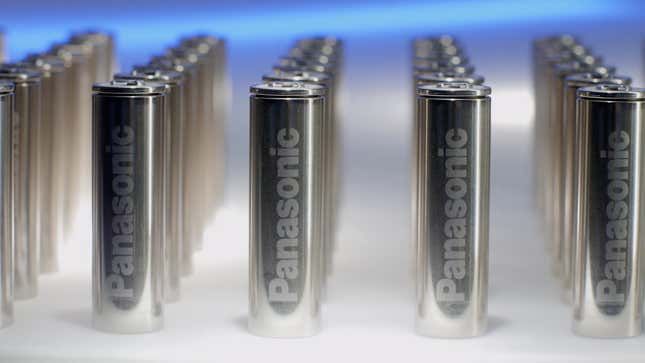
A massive, $4 billion Panasonic electric vehicle battery factory is coming to Kansas. The Wednesday announcement followed about 45 minutes of closed door discussion between company and state stakeholders, where media were excluded, according to a report from the Topeka Capital-Journal.
“Kansas is no longer an aw shucks, humble sort of flyover state. We can compete with anyone, and we can say loudly and proudly that Kansas is the best state in the nation for investment,” said Lieutenant Governor David Toland in a press conference following the finalized factory deal.
Gov. Laura Kelly then approached the stage while “Taking Care of Business” played over the speakers. “The energy in this room feels electric,” she quipped before the official announcement. “Panasonic Energy plans to build one of the largest EV battery manufacturing facilities of its kind in De Soto, Kansas.” The new factory will sit on the site of a former Sunflower Army Ammunition Plant.
Panasonic is a major supplier of EV batteries for Tesla, and the planned factory will be a boost for Elon Musk’s car company. The new plant will build high-capacity cells for Tesla, according to a report from Nikkei Asia. Currently, Panasonic operates one large battery production site at the Tesla Gigafactory 1 in Sparks, Nevada. Another Tesla Gigafactory in Austin, Texas opened in April. That facility is a likely future destination for the batteries set to be built in Kansas.
The state estimates that 4,000 permanent jobs and 16,500 construction jobs will result from the Panasonic partnership, according to an economic impact study. Note: De Soto’s current population is only 6,118, according to 2020 census data. Kansas itself will be on the hook for an incentive package totaling around $830 million, according to the Topeka Capital-Journal—a big part of what likely incentivized the company to make its location selection (aside from convenient proximity to Texas).
“Winning this project shows that Kansas has what it takes to compete on a global scale — and that our pro-business climate is driving the technological innovation needed to achieve a more prosperous and sustainable future,” said Kelly.
And sure, making and driving electric vehicles is probably a climate net good compared with making and driving gas guzzlers. But an EV’s climate emissions are only as green as the broader energy grid. Plus, the lithium-ion battery industry is by no means sustainable in its current form. Demand for lithium alone is projected to grow by 70 times over the next few decades, according to the International Energy Agency. And lithium mining has the potential to lead to major biodiversity loss, air and water pollution, and other environmental disasters.
Which brings us to the question of “why?” Why is it that the s0-called biggest ever private investment in Kansas is for the production of parts to keep the U.S driving our inefficient, individual cars into the next century? Have we learned nothing?
There is undoubtedly a place for electric vehicles in the future. They could be super useful for some things—for instance, mail delivery. But what if everyone in the U.S. didn’t need to buy a Tesla? What if, instead of this factory, Kansas got a big ol’ mass transit system?